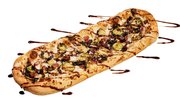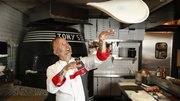News
The top fast casual stories for 2008
January 7, 2009
The year 2008 proved to be an interesting one for fast casual operators. Here's a rundown of our top five stories for the year.
1. The economy. While casual dining chains struggled to find their way in 2008, their fast casual counterparts rose to the economic challenge. Not only did fast casuals benefit from the economic downturn, they shifted consumer and industry awareness. Casual dining chains launched fast casual concepts and consumers flocked to fast casual restaurants in search of high-quality food at an affordable cost.
Some brands did face economic hardships, however. Organic To Go laid off a third of its staff, Starbucks closed 600 underperfoming locations and Panera Bread decided to drop its Crispani pizza. Operators across the board also did more to track food waste and cut costs throughout the year.
Adding to the economic strain was the second of three minimum wage increases that took effect in July. The increase raised minimum wage by 70 cents to $6.55 per hour. The third and final increase will take place July 24, and will increase minimum wage to $7.25 an hour.
2. Foodsafety. Every year there seems to be at least one story of a salmonella outbreak and 2008 was no different. The salmonella St. Paul outbreak was the top news story of the summer, with more than 1,400 people sickened by the bacteria. The Center for Disease Control's advisory to stop eating certain kinds of tomatoes hit the tomato industry hard, with an estimated $100 million loss before they were cleared for consumption in mid-July.
The Food and Drug Administration investigation never linked the strain to tomatoes but did find traces on jalapeno and Serrano peppers grown in Mexico. The outbreak ended with no definitive conclusion.
Fast casuals operators were by all accounts unfazed by the lack of tomatoes. Many operators altered menu items to accommodate the restriction or found other sources of the produce. And as a result of the outbreak, the FDA is working on improving investigation times and strengthening food safety regulations.
3. The green machine. The color green was never as red hot as it was in 2008. Consumer demand for all things environmentally friendly made restaurant operators stop and take notice.
Brands are now vying for certification from the Green Restaurant Association, using biodegradable containers, hybrid delivery vehicles and buying renewable energy, all in an effort to show consumers how "green" they really are.
Chipotle has led the way in this effort but concepts such as Pizza Fusion, Boloco and Elevation Burger are not far behind. And now that sustainability has risen as the new industry buzzword, it's a sure bet green is gold and changing the way the industry does business.
4. Starbucks rebrand. You know there's an issue when a once formidable coffee powerhouse announces the closure of 600 locations and retrains nearly all in-store staff. Starbucks used 2008 to work on its image, both internally and externally, and used former CEO Howard Schultz to lead the charge.
Schultz retook the reigns at Starbucks in January 2008 and unveiled a series of customer-facing initiatives at its annual March shareholder meeting. Plans included a complete reinvention of brewed coffee in-store, the introduction of a new espresso system and the first phase of a Starbucks Card Rewards program.
Starbucks still found itself in hot water several months later. In August the company announced its first-ever quarterly loss and cut 600 nonstore positions.
5. Low-cal and smaller portions.Smaller portions and low-calorie menu items made a huge splash in 2008. During the year,Au Bon Pain introduced its Portions menu and Quiznos introduced their 200-calorie Sammies. The menu introductions highlight a few of the ways fast casual operators tried to tackle the obesity issue in 2008.
High fructose corn syrup also came under fire as some fast casual operators eliminated soda fountains, opting instead to offer specialty beverages. Saladworks signed a deal to offer Arizona Iced Tea at its locations and Mad Greens Inspired Eats tested Nestle's Sjora beverage, made with 10 percent milk and 5 percent juice, in its Denver-area restaurants.
 ChatGPT
ChatGPT Grok
Grok Perplexity
Perplexity Claude
Claude












